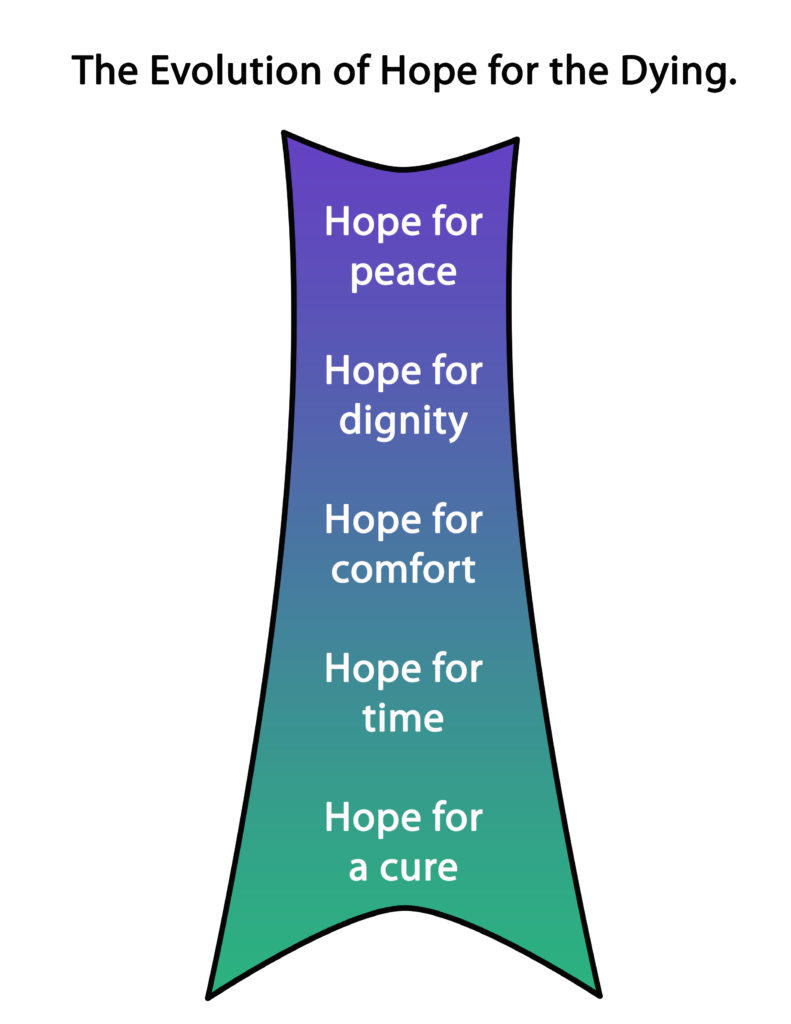The Evolution of Hope
by Linda Strause, PhD, Vice President, G. Randall & Sons and Randy’s Club
As we begin to gather for the holidays, with family and friends, we prepare for the laughter and joy that the season brings. Yet for many people the holidays bring memories of loss and for others they may bring fear of what the future holds. Regardless, for these individuals the concept of hope rings true and strong.
When caring for a loved one with a life-threatening disease, the holidays may often bring different challenges. Although we put our trust in the hands of our doctor’s it is ultimately a personal decision when it comes to choices about care, and those choices become more limited as we approach the end of life. Hope is a good indicator of positive medical outcomes. Studies have found that a hopeful patient is more likely to experience good medical outcomes than a patient who has lost all hope. It is important to preserve this feature while balancing it against the reasonable expectation of success. Giving up hope of cure is not the same as giving up hope all together. Accepting the inevitability of death is not the same as giving up hope. One can still hope for love, comfort and solace in your final days.
There are dates imprinted in my mind as I began caring for, or more appropriately “soul sitting” for my husband, Randy. Diagnosed with incurable brain cancer on April 8th, 2008 that day will forever be one of both fear and hope. And it was hope that we hung onto. Hope is the emotional state which promotes the belief in a positive outcome. Family and friends gathered together and together we hoped that a cure was obtainable. We maintained our hope that Randy would be that rare one to two percent that would beat this terrible disease. For the first year our life seemed to be balanced between fear and hope, and I was beginning to learn how to manage that hope.
It was a sunny, fall day in September 2009 when together we listened to the most recent MRI findings. This time it wasn’t good. This time the options were minimal. Our two sons moved back home and we discussed our options. We had a party for many old friends, went to Mexico to scuba dive and attend a wedding, and traveled to India with our extended family.
Early in February 2010 my older son called me to let me know that Randy was feeling numbness in his right arm. Literally within days the numbness spread throughout his right side, eating became difficult, and mobility limited. I had to make another difficult decision, the decision to call hospice. There was a quietness that penetrated every pore of my body, deep within my soul. Family and friends were silently concerned. Was this the end? Have they, meaning Tyler, Brendon, and I, given up hope?
There is an evolution of hope for the dying. Hope is never lost, hope is never given up, but hope is forever evolving. Initially our hope was for a cure. We embraced the power of that hope and our decisions were predicated on finding a cure. Later we found that our hope had evolved. We found joy in the extra time we had together and comfort in knowing that Randy was not in any pain. And for a long while we held on to our hope for time and our hope for comfort. As we journeyed to that transition phase hope again had evolved. We knew we had to embrace the knowledge that there was no going back. To hope for an unattainable cure is not an option. And our hope evolved again. We hoped that Randy, a husband and father, would die with dignity and peacefully. We hoped that we would be able to balance the quality of his life with dignity in his death. We hoped that his soul would rest in peace and remain forever in our hearts. Just before midnight on April 16, 2010, Randy died at home, surrounded by his family.
One of Viktor Frankl’s most powerful insights, described in his book “Man’s Search for Meaning”, is that forces beyond your control can take away everything you possess except one thing, your freedom to choose HOW you will respond to the situation. When caring for a loved one facing a life-threatening disease it is immediately apparent that you do not have control over what will or may happen. However, you can always control what you will feel and do about what happens to you. Randy’s Club is our way of keeping Randy’s legacy and spirit alive. Visit www.randysclub.org and learn more about our story and a special man’s legacy.
Remember, at the end of life HOPE still remains strong.



